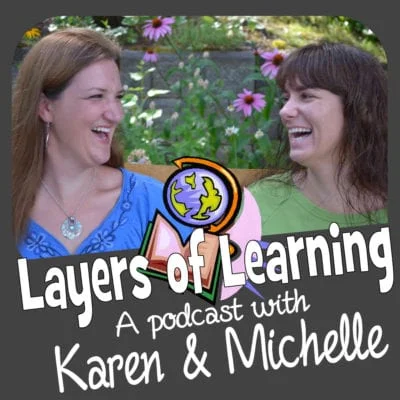
The Layers of Learning Podcast with Karen and Michelle is here to help you get your whole family learning together in your homeschool. We are the sisters behind Layers of Learning. We love getting together to chat about homeschooling and this podcast is just a series of our chats. We’re inviting you to listen in on our conversations.
We both have big families, but we teach almost all of our school subjects to everyone at once. We want to help you find the joy in that too, so we talk a lot about family homeschooling. To see all of our episodes, visit our Layers of Learning Podcast Page. Join us as we explore how to have a happy, hands-on, family-style homeschool.
Evaluating Sources

One of the biggest components of an education is learning how to learn. One of the most important skills in learning is researching. Layers of Learning is a curriculum that encourages research and learning how to learn. As you begin to pursue knowledge, you’ll soon see that not all sources are created equal. When you’re learning with Layers of Learning, you’re relying on lots of sources, lots of authors, lots of books! As you begin to delve into them, you’ll notice that sometimes authors disagree on the same topics. It turns out, ANYONE can write ANYTHING, and it’s your privilege to learn how to evaluate the sources you read.
In this podcast, you’ll learn about the CRAAP test, how to use encyclopedias as a jumping off place for your research, and how to locate quality sources and scholarly journals. Little ones will likely use simple library books and YouTube videos, but as your kids get into high school or as you’re pursuing your own adult education, this podcast episode will give you some bearings on how to find and evaluate good sources.
Here Are A Few Topics You’ll Hear About In This Podcast
- The CRAAP Test – Currency, Relevance, Authority, Accuracy, and Purpose
- Other than primary sources, more recent sources tend to be more informed.
- Especially when it comes to online sources, look for relevance. Is the author really teaching you or just trying to sell you something?
- Everyone has opinions about thing, but you are looking for opinions by authorities. Learn to evaluate who the authors are and know whether or not they have the authority or background to teach you.
- Read multiple books and websites about topics so you can gauge whether the information is accurate and consistent across the sources. If you have one that doesn’t seem to agree with the others, it like isn’t accurate.
- Notice what the purpose of the source is. If they are one-sided rather than well-rounded, you might consider the source suspect.
- A few places to research: Wikipedia, JSTOR.org, Google Scholar, the Digital Public Library of America, the New York Public Library, the New York Times Time Machine
- In general, you need one source for each page of a research paper or essay you’re writing. Include books as well as online journals.
Podcast: Play in new window | Download
Subscribe: Apple Podcasts | Spotify | Podcast Index | Email | Deezer | RSS | More
Get a Free Unit
Choose between the first unit in each Layers of Learning subject to try for free when you sign up for the newsletter.
We never spam and you can cancel your subscription at any time.

